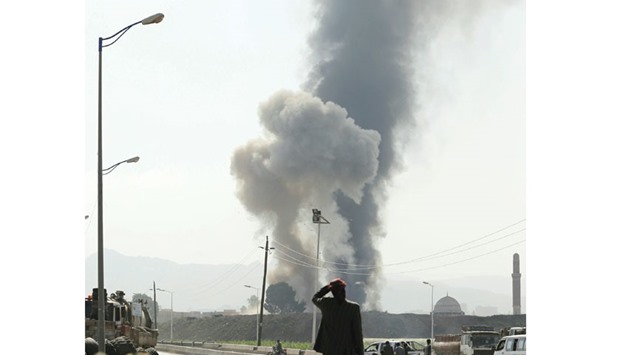Residents said the air raids hit the house overnight.
There was no immediate reaction from the coalition, and AFP was unable to confirm the report from independent sources as Saada is under the rebels’ complete control.
The Arab coalition launched a military campaign against the Houthis and their allies in March 2015, after the Shia rebels closed in on Gulf-backed President Abd-Rabbu Mansour Hadi in his southern refuge in Aden forcing him into exile.
Saada and surrounding parts of northern Yemen have long been strongholds for the Houthis.
But they later joined up with forces with loyal to former president Ali Abdullah Saleh, before seizing Sanaa in September 2014 and forming their own governing body.
The coalition has stepped up its air raids since three months of peace talks in Kuwait collapsed earlier last month.
The rebels have also intensified their attacks on the Saudi border.
Yesterday, a Saudi border guard, Corporal Abdullah Madkhali, was killed after shelling from Yemen hit a frontier post in the Jazan region, the kingdom’s interior ministry said.
Cross-border fire from Yemen has killed about 100 civilians and members of the security forces on the Saudi side since the war began.
The latest escalation prompted UN envoy Ismail Ould Cheikh Ahmed to call yesterday for a return to a ceasefire in Yemen which he said was “critical” to renewing peace talks.
Three months of negotiations in Kuwait ended without a breakthrough on August 7, triggering what the UN envoy described as a “dangerous escalation in military activities.”
“In order to accelerate the path to renewed talks, the resumption of the cessation of hostilities will be critical,” he told the Security Council.
A new ceasefire will “spare Yemen the further loss of life, allow the increased flow of humanitarian assistance and generate much needed confidence for the negotiation of a comprehensive and peaceful solution,” he said.
The envoy said a new ceasefire should begin with the deployment of a de-escalation committee in the border area of Dharan al-Janub and should include “a full end to all military activities by land, sea or air, and using any kind of weapon.”
There had been some hope of a settlement when a ceasefire was agreed on April 10 and talks convened in Kuwait, but the peace process broke down over disputes on the formation of a unity government and the withdrawal of rebel forces.
During a meeting last week between US Secretary of State John Kerry and Gulf ministers, a proposed agreement was reached calling for a unity government that will include the Houthis to be formed immediately following the rebel withdrawal from Sanaa and other areas and the handover of weapons.
Yemen’s government has said it welcomes the US-backed plan in principle while the rebels have also sent out positive signals.
The envoy stressed the need for quick progress, given the worsening economic crisis.

